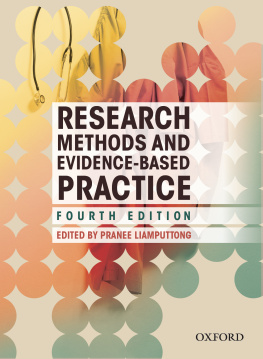Focus Group Methodology
SAGE has been part of the global academic community since 1965, supporting high quality research and learning that transforms society and our understanding of individuals, groups and cultures. SAGE is the independent, innovative, natural home for authors, editors and societies who share our commitment and passion for the social sciences.
Find out more at: www.sagepublications.com
Focus Group Methodology
Principles and Practice
Pranee Liamputtong
Pranee Liamputtong 2011
First published 2011
Apart from any fair dealing for the purposes of research or private study, or criticism or review, as permitted under the Copyright, Designs and Patents Act, 1988, this publication may be reproduced, stored or transmitted in any form, or by any means, only with the prior permission in writing of the publishers, or in the case of reprographic reproduction, in accordance with the terms of licences issued by the Copyright Licensing Agency. Enquiries concerning reproduction outside those terms should be sent to the publishers.
SAGE Publications Ltd
1 Olivers Yard
55 City Road
London EC1Y 1SP
SAGE Publications Inc.
2455 Teller Road
Thousand Oaks, California 91320
SAGE Publications India Pvt Ltd
B 1/I 1 Mohan Cooperative Industrial Area
Mathura Road
New Delhi 110 044
SAGE Publications Asia-Pacific Pte Ltd
33 Pekin Street #02-01
Far East Square
Singapore 048763
Library of Congress Control Number: 2010931532
British Library Cataloguing in Publication data
A catalogue record for this book is available from the British Library
ISBN 978-1-84787-908-0
ISBN 978-1-84787-909-7 (pbk)
Typeset by C&M Digitals (P) Ltd, Chennai, India
Printed by MPG Books Group, Bodmin, Cornwall
Printed on paper from sustainable resources
To my children:
Zoe Sanipreeya Rice and Emma Inturatana Rice
CONTENTS
ABOUT THE AUTHOR
Pranee Liamputtong is a medical anthropologist and holds a position of Personal Chair in Public Health at the School of Public Health, La Trobe University, Melbourne, Australia.
Pranee has a particular interest in issues relating to cultural and social influences on childbearing, childrearing and womens reproductive and sexual health. She has undertaken many research projects with immigrant women in Australia and women in Southeast Asia. Pranee has published numerous books and a large number of papers in these areas. Her recent books in the health area include: The journey of becoming a mother amongst women in northern Thailand (Lexington Books, 2007); Community, health and population (Oxford University Press, 2008); and Infant feeding practices: A cross-cultural perspective (Springer, 2010). She is editing a series of books on HIV/AIDS for Springer including two upcoming books: Motherhood and HIV/AIDS: A cross-cultural perspective, and Stigma, discrimination and HIV/AIDS: A cross-cultural perspective.
Pranee is a qualitative researcher and has also published several methods books. Her most recent ones include: Researching the vulnerable: A guide to sensitive research methods (Sage, 2007); Qualitative research methods, 3rd edition (Oxford University Press, 2009); Performing qualitative cross-cultural research (Cambridge University Press, 2010); and Research methods in health: Foundations for evidence-based practice (Oxford University Press, 2010).
PREFACE
Focus group methodology has been used for a long time in marketing research, but it is only in the last decade or so that it has started to gain popularity as a research method within the health and social sciences. Focus group interviews are now employed extensively. A review of online databases in social science in 1994 alone shows that over 100 papers utilising focus groups as a method appeared in refereed journals. A content analysis of the materials from Sociological Abstracts over the past decade indicates that more than 60 per cent of research employing focus groups was done in combination with other research methods. However, self-contained focus group research has gradually become more common in recent years.
In this book, I demonstrate that the focus group methodology is not new. It can be traced back to the year 1926 when Emory Bogardus described group interviews in social science research. The methodology was also used during the Second World War when Robert Merton employed the method to examine peoples reactions to wartime propaganda and the effectiveness of training materials for the soldiers. In the same period, the methodology was introduced into marketing research. Since then, focus groups have been popular and used extensively in the applied social sciences. The methodology has started to gain popularity in research relating to different social groups and in cross-cultural and development research. The main argument for using this methodology in this context is the collective nature, which may suit people who cannot articulate their thoughts easily, and which provides collective power to marginalised people. Hence, we have seen more articles dedicated to the use of focus groups in different social and cultural groups. Additionally, the Internet has become a site and source of data collection for many health and social science researchers. We have begun to witness more virtual focus groups in recent times. However, to my knowledge, there is not a single book that includes all of the issues mentioned above. In this volume, I propose to bridge the main gap in the literature.
This book includes discussions relating to the use of focus group methodology in the health and social sciences. I cover both theoretical and practical aspects of research using the focus group methodology. I also include detailed suggestions on how to adapt focus groups in diverse social and cultural settings and with different groups of people including vulnerable and marginalised populations and in cross-cultural research. The volume also includes a chapter on virtual focus groups, a new trend and innovative means of conducting focus groups in the health and social sciences. It is essential that a book like this needs to provide discussions on how to manage and make sense of focus group data. These issues are also included in this book.
In each chapter, I integrate the following features: chapter objectives, chapter summaries, case examples, tutorial exercises and sources of further reading. Case examples are drawn from a wide selection of extended empirical studies in the United States, United Kingdom, Canada, Australia and other English-speaking and non-English-speaking countries. I also use simple language that students and novice researchers are able to follow easily.
The book is aimed at students and interested researchers. It is particularly pertinent to postgraduate students who are carrying out research as part of their degrees, and who are interested in qualitative focus group methodology. The book is useful for researchers who wish to have a basic understanding of focus groups and need to adopt the methodology to suit the exigencies and circumstances of their research in different social and cultural settings. It can also be used as a textbook for both undergraduates and postgraduate in health sciences, medical sciences, social work, anthropology, sociology, cross-cultural and development studies since it contains simple research methodology for the students to follow and many case examples for illustrating the points.









